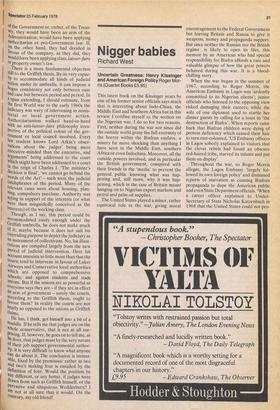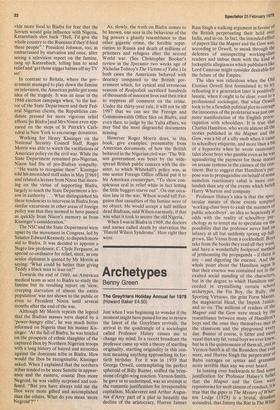Nigger babies
Richard West
Uncertain Greatness: Henry Kissinger and American Foreign Policy Roger Morris (Quartet Books £5.95) This latest book on the Kissinger years by one of his former senior officials says much that is interesting about Indo-China, the Middle East and Southern Africa but in this review I confine myself to the section on the Nigerian war. I do so for two reasons. First, neither during the war nor since did the outside world grasp the full enormity of the horror within the Biafran enclave, a misery far more shocking than anything I have seen in the Middle East, southern Africa or even Indochina. Moreover, all the outside powers involved, and in particular the British government, conspired with their friends in the 'media' to prevent the general public knowing what was happening and, still more, why it was happening, which in the case of Britain meant hanging on to Nigerian export markets and petrol and palm oil supplies.
The United States played a minor, rather equivocal role in the war, giving moral encouragement to the Federal Government but leaving Britain and Russia to give it weapons, money and propaganda support. But since neither the Russian nor the British regime is likely to open its files, this memoir by an American who had special responsibility for Biafra affords a rare and valuable glimpse of how the great powers behaved during this war. It is a bloodchilling story.
When the war began in the summer of 1967, according to Roger Morris, the American Embassy in Lagos was 'ardently committed to its Nigerian clients'; junior officials who listened to the opposing view risked damaging their careers; while the wife of one diplomat used to startle her dinner guests by calling for a toast to 'the destruction of Biafra'. When reports came back that Biafran children were dying of protein deficiency which caused their hair to turn rust-coloured, 'US Embassy officers in Lagos soberly explained to visitors that the clever rebels had found an obscure red-haired tribe, starved its infants and put them on display'.
Throughout the war, so Roger Morris alleges, the Lagos Embassy 'largely followed its own foreign policy' and dismissed reports of starvation as cunning Biafran propaganda to dupe the American public and even State Department officials. 'When a career officer explained to UnderSecretary of State Nicholas Katzenbach in 1968 that the United States could not pro vide more food to Biafra for fear that the Soviets would gain influence with Nigeria, Katzenbach shot back "Hell, I'd give the whole country to the Russians if they'd feed these people".' President Johnson, too, as embarrassed by starvation and once, after seeing a television report on the famine, rang up Katzenbach, telling him to send relief and 'get those nigger babies off my TV set'.
In contrast to Britain, where the government managed to play down the famine on television, the American public got some idea of the tragedy. It was an issue in the 1968 election campaign when, `to the horror of the State Department and their Federal Nigerian clients, the Republican candidate pressed for more vigorous relief efforts Ito Biafra] and Mrs Nixon even appeared on the steps of St Patrick's Cathedral in New York to encourage donations.
Working for Henry Kissinger on the National Security Council Staff, Roger Morris was able to watch the vacillations of American policy on the civil war. While the State Department remained pro-Nigerian, Nixon had fits of pro-Biafran sympathy. '"He wants to recognise them", Kissinger told his astonished staff aides in May119691 and related a lecture from Nixon that morning on the virtue of supporting Biafra, largely to teach the State Department a lesson in authority. . . What distinguished his these tendencies to intervene in Biafra from similar excursions in other areas of foreign policy was that they seemed to have passed as quickly from Nixon's memory as from Kissinger's consideration.'
The NSC and the State Department were upset by the movement in Congress, led by Senator Edward Kennedy, to dispatch more aid to Biafra. It was decided to appoint a Negro law professor, C. Clyde Ferguson, as special co-ordinator for relief, since, as one senior diplomat is quoted by Mr Morris as saying: 'What could be better than giving Teddy a black man to lean on?'
Towards the end of 1969, an American medical team as sent to Biafra to study the famine but its resulting report on 'slow, creeping starvation of almost the entire population' was not shown to the public or even to President Nixon until several months after the end of the war.
Although Mr Morris repeats the legend that the Biafran masses were duped by a 'power-hungry elite', he was much better informed on Nigeria than his master Kissinger: 'At the fall of Biafra, he was briefed on the prospects of ethnic slaughter of the captured Ibos by Northern Nigerian troops with a long history of hatred and atrocities against the dominant tribe in Biafra. How would the Ibos be recognisable, Kissinger asked. When I explained that the northern tribes tended to be more Semitic in appearance and the eastern, coastal Ibos more Negroid, he was visibly surprised and confused. "But you have always told me the Ibos were more gifted and accomplished than the others. What do you mean 'more Negroid"?"'
As, slowly, the truth on Biafra comes to be known, one sees in the behaviour of the big powers a ghastly resemblance to that other gigantic crime, the forcible repatriation to Russia and death of millions of prisoners and refugees after the second World war. (See Christopher Booker's review in the Spectator two weeks ago of Nicholas Tolstoy's The Victims of Yalta.) In both cases the Americans behaved with decency compared to the British government which, for cynical and erroneous reasons of Realpolitik sacrificed hundreds of thousands of innocent lives and then tried to suppress all comment on the crime. Under the thirty-year rule, it will not be till 1997 that we can see the Foreign and Commonwealth Office files on Biafra, and even then, to judge by the Yalta affairs, we may find the most disgraceful documents missing.
However Roger Morris does, in this book, give examples, presumably from American documents, of how the British behaved in the Nigerian civil war: 'The Wilson government was beset by the widespread British public concern with the disaster, to which Whitehall's policy was, as one senior Foreign Office official put it to his American counterpart, "To show conspicuous zeal in relief while in fact letting the little buggers starve out". On one occasion late in the war, Wilson would tell Ferguson that casualties of the famine were of no object. He would accept a half million dead Biafrans, said Wilson earnestly, if that was what it took to secure the old Nigeria.'
When I was in Biafra in 1969, the doctors and nurses called death by starvation the 'Harold Wilson Syndrome'. How right they were.



































 Previous page
Previous page